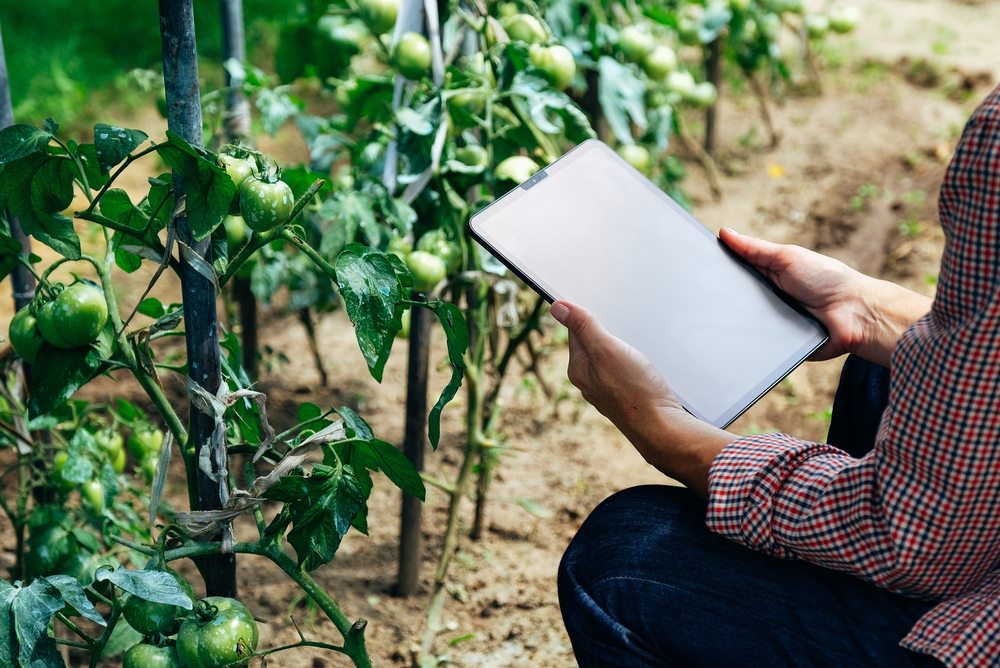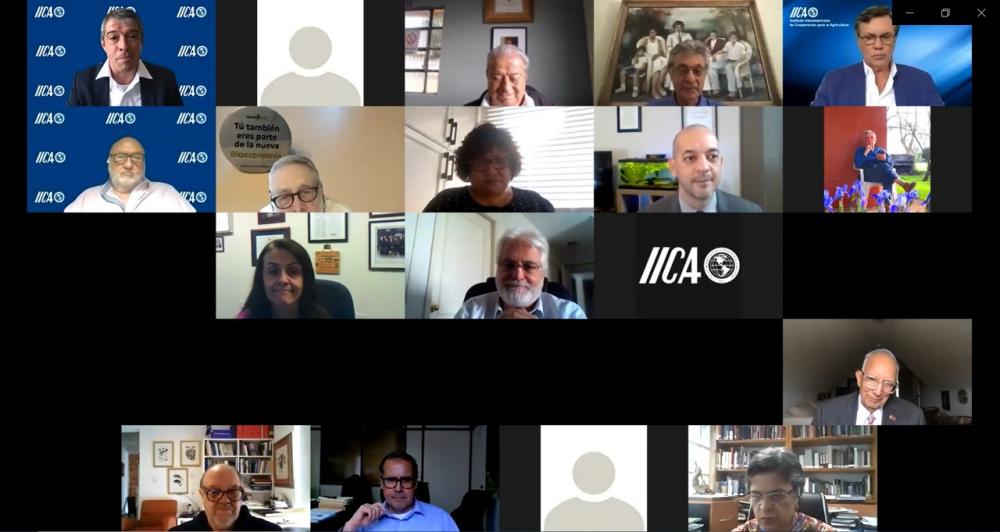The members of the Advisory Council for Food Security in the Americas, the Goodwill Ambassadors and the Director General of IICA discussed the future of agriculture and rurality. They also shared their views regarding the global health crisis.

San Jose, 10 December 2020 (IICA). Extraordinary technological developments in the agriculture sector have allowed for significantly increasing production yields in recent years, in harmony with the environment. As a result, the sector now has the possibility to feed all of humanity. However, food is still not reaching the most vulnerable populations in sufficient quantities, and well-being for those who live and produce in rural areas is often out of reach.
Therefore, world agriculture now faces the challenge of providing adequate volumes of food for the people who need them, as well as ensuring that producers are able to lead prosperous lives in rural areas. Amidst the pandemic, these challenges have become more pressing than ever.
This was the main topic of discussion at the 12th Meeting of the Advisory Council for Food Security in the Americas of the Inter-American Institute for Cooperation on Agriculture (IICA), which was held virtually and was also attended by the Institute’s Goodwill Ambassadors.
The Advisory Council was established by IICA to serve as a forum for reflection and the generation of ideas for future scenarios. Specifically, the members aim to identify the direction global agriculture is headed, as well as the implications of these new trends for the Institute’s technical cooperation agenda. The Council also seeks to provide the Member States with analyses and knowledge within a highly uncertain context.
The Council is made up of leading professionals from ten countries who have made significant contributions to the agrifood sector, both in the political and academic spheres.
IICA’s Goodwill Ambassadors share concerns and commitments related to the achievement of sustainable and equitable development. They are also willing to join a cause aimed at increasing public awareness and strengthening development through projects related to food security, bioeconomy, gender and youth, and responsible production, which are key topics in IICA’s agenda.
Argentinean psychiatrist and businessman Hugo Sigman, one of IICA’s Goodwill Ambassadors, was a guest speaker at the meeting. Among other things, he discussed the impact of the pandemic on food security, as well as the consequences of the health crisis.
Sigman described the progress that has been achieved within the agriculture sector, thanks to new developments such as improvements in seeds and the introduction of no-till farming. This has allowed for significantly increasing yields while protecting natural resources, in a way that hadn’t been done before.
“These advances must be consolidated and extended to livestock farming, which is still not as efficient as agriculture”, stated Sigman. The businessman added that “it is deplorable that people are still dying of hunger or undernourished, but if we continue on this path, we can look to the future with optimism”.
In his capacity as founder and shareholder of INSUD, a business conglomerate dedicated to the pharmaceutical, agroforestry, cultural, nature and design industries, Sigman also discussed health outlooks, given that he leads the laboratory that will produce the active ingredient of the Covid-19 vaccine developed by the University of Oxford and the firm AstraZeneca for all Latin America, except for Brazil.
“Our region will begin mass vaccination in late March or early April. Therefore, it is to be expected that a large number of people will be vaccinated by mid-year, and that life will return to what it was like before this terrible pandemic. We need to shake hands and hug each other”, stated Sigman, who highlighted the extraordinary cooperation that has taken place within the global scientific community to address the crisis.
In that sense, Sigman recalled that “the agreement between the University of Oxford and AstraZeneca establishes that, for as long as the pandemic lasts, the company will sell the vaccine without making any profit. In my experience of more than 40 years in the pharmaceutical industry, I have never heard anything like that. It is a unique and historic decision”.
“This vaccine will be sold worldwide for about 3 to 4 dollars, depending on the country. Compared to all the other vaccines, the price difference is enormous—even more so when we consider the fact that between 7 and 10 billion vaccines will be applied around the world next year”, indicated the businessman.
Sigman also considered that, amidst emergency situations such as the one we are currently experiencing in the region and around the world, public policies are needed to strike a balance between profitability for those who produce food and the prices that consumers are able to pay.
“I don’t believe that absolute free trade is possible in extreme situations. China’s high demand for agricultural products and meat has increased prices over the past year, so government intervention is crucial to guarantee food production and access to food, which are absolutely essential”, he explained.
IICA’s Advisory Council for Food Security in the Americas is made up of Silvia Sarapura (Canada), Gloria Abraham (Costa Rica); Chelston Brathwaite (Barbados); Carlos Gustavo Cano (Colombia); José María Sumpsi (Spain), Cassio Luiselli (Mexico); Elsa Murano (United States); Martín Piñeiro (Argentina); Álvaro Ramos (Uruguay); Roberto Rodrigues (Brazil) and Eduardo Trigo (Argentina).
On the other hand, the IICA Goodwill Ambassadors are Argentinean entrepreneur Susana Balbo; Mexican senator Beatriz Paredes; scientist Rattan Lal, co-laureate of the 2007 Nobel Peace Prize and 2020 World Food Prize winner; Michael Kremer, winner of the 2019 Nobel Prize in Economics; Hugo Sigman; Alysson Paolinelli, former Minister of Agriculture of Brazil; Jens Mesa, Executive President of the National Federation of Palm Oil Growers (Fedepalma) of Colombia; and Garden Pool CEO Dennis McClung.

Transferring knowledge and technologies to small-scale producers
Professor Lal, who launched the “Living Soils of the Americas” initiative with IICA a few days ago, drew attention to the fact that the pandemic has demonstrated the need to strengthen local agrifood production systems, given the difficulties faced with respect to marketing and food supply. In that regard, he also stressed that we must now focus on transferring knowledge and technologies to small-scale producers of the Americas—who represent more than 80% of farmers in our hemisphere—in order to make their food increasingly nutritious and ensure that it contains the proteins and minerals required to lead a healthy life.
The significant technological transformations that are taking place in rural areas were a key topic of discussion. The current scenario calls for policies that can facilitate the inclusion of family farmers and cooperative undertakings in digitalization efforts, to improve their capacity to compete in markets with other agrifood companies.
Silvia Sarapura, an academic specializing in agrifood systems at the University of Guelph (Canada), inquired about the present and future role of family farmers and local innovation amidst the major technological changes taking place in agriculture.
Sigman responded that, in his experience, changes must be implemented progressively. “New technologies must be combined with the productive and cultural traditions developed over many generations in each rural area. We must take things one step at a time; changes cannot be imposed abruptly”.
According to Álvaro Ramos, former Minister of Livestock, Agriculture and Fisheries of Uruguay, greater coverage and connectivity in rural territories of Latin America and the Caribbean affords interesting opportunities.
“This is a topic we have been discussing for 30 years in our region. Today, we have the greatest opportunity for technology transfer, because digitalization can reach small-scale producers more efficiently and cheaply than ever before”, he remarked.
Participants also discussed the cultural changes that take place when new information and communication technologies are introduced.
Dennis McClung cautioned that the public and private sectors must support local leaders in the various countries who are taking initiative in this regard, and who can assist in conveying the need to modernize agricultural practices in the most credible and reliable manner.
Family farmers are key players in agrifood production in the Americas, and it is important to empower them. “We must assist them in overcoming the difficulties they face by facilitating land tenure and access to technology and credit opportunities. But we must not treat them as if they do not know how to produce, because they know how to do so quite well. We are convinced that family farmers are part of the solution, not the problem”, concluded the Director General of IICA, Manuel Otero.
More information:
Institutional Communication Division of IICA.
comunicacion.institucional@iica.int











